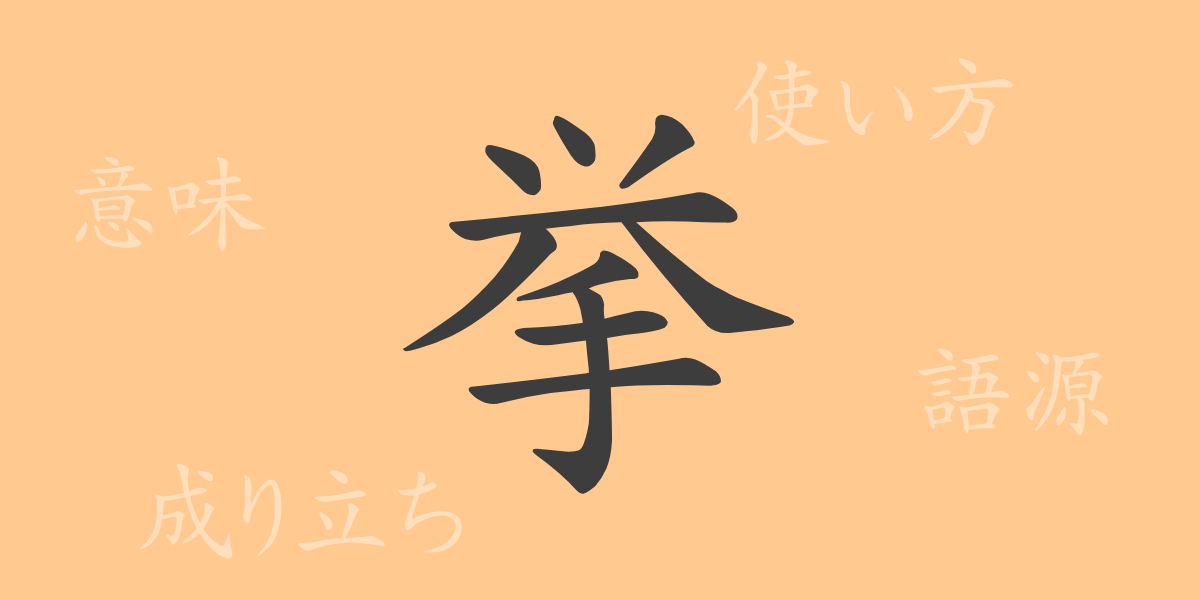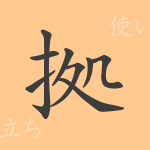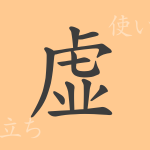The Japanese writing system relies heavily on kanji, and among them, the character “挙(きょ, kyo)” is one of the frequently used kanji in daily life. This article delves deeply into the origins, meanings, and uses of the kanji “挙(きょ, kyo),” including idiomatic expressions and proverbs that feature this character. Let’s explore the world of “挙(きょ, kyo)” which symbolizes both the beauty and complexity of the Japanese language.
Origin of 挙(きょ, kyo)
The kanji “挙(きょ, kyo)” originates from ancient China. It is composed of the radical “扌(てへん, tehen)” meaning “hand,” and “兴(こう, kou)” which historically signifies something high. Originally, it depicted the action of raising a hand high. Over time, this physical action evolved to carry more abstract meanings and came to be used in various contexts.
Meaning and Usage of 挙(きょ, kyo)
The kanji “挙(きょ, kyo)” signifies actions such as “to raise” or “to conduct.” Specifically, it can mean to lift something high or to perform an action. It is used in various situations, such as raising one’s hand at a ceremony or celebrating a wedding. Abstractly, it is also used in expressions like “to give an example,” indicating the act of presenting or demonstrating something.
Readings, Stroke Count, and Radical of 挙(きょ, kyo)
Here are the primary readings and characteristics of the kanji “挙(きょ, kyo)” in Japanese:
- Readings: The on-yomi (Chinese reading) is “キョ(きょ, kyo),” and the kun-yomi (Japanese reading) is “あ.げる(あげる, ageru)” or “あ.がる(あがる, agaru).”
- Stroke count: “挙(きょ, kyo)” has a total of 10 strokes.
- Radical: The radical is “扌(てへん, tehen)” meaning “hand.”
Idioms, Proverbs, and Phrases Using 挙(きょ, kyo)
There are numerous idioms, proverbs, and phrases in Japanese that incorporate “挙(きょ, kyo).” Here are a few examples:
- 挙国一致(きょこくいっち, kyokoku itchi): The entire nation united in a common effort.
- 挙手擧足(きょしゅきょそく, kyoshu kyosoku): Every action and behavior of a person.
- 例を挙げる(れいをあげる, rei o ageru): To give a concrete example.
- 手を挙げる(てをあげる, te o ageru): To raise one’s hand, often in voting or indicating willingness.
- 名を挙げる(なをあげる, na o ageru): To raise one’s reputation or achieve fame.
Summary of 挙(きょ, kyo)
The kanji “挙(きょ, kyo)” evokes the idea of an action from its form, symbolizing a range of activities from concrete actions to abstract concepts. The use of “挙(きょ, kyo)” in Japanese illustrates the rich cultural heritage and depth of the language. Understanding the origins and meanings of “挙(きょ, kyo),” along with its idioms, enhances our appreciation of the flexibility and expressiveness of Japanese. Recognizing the background of this commonly seen kanji enriches our overall understanding of the language.

























